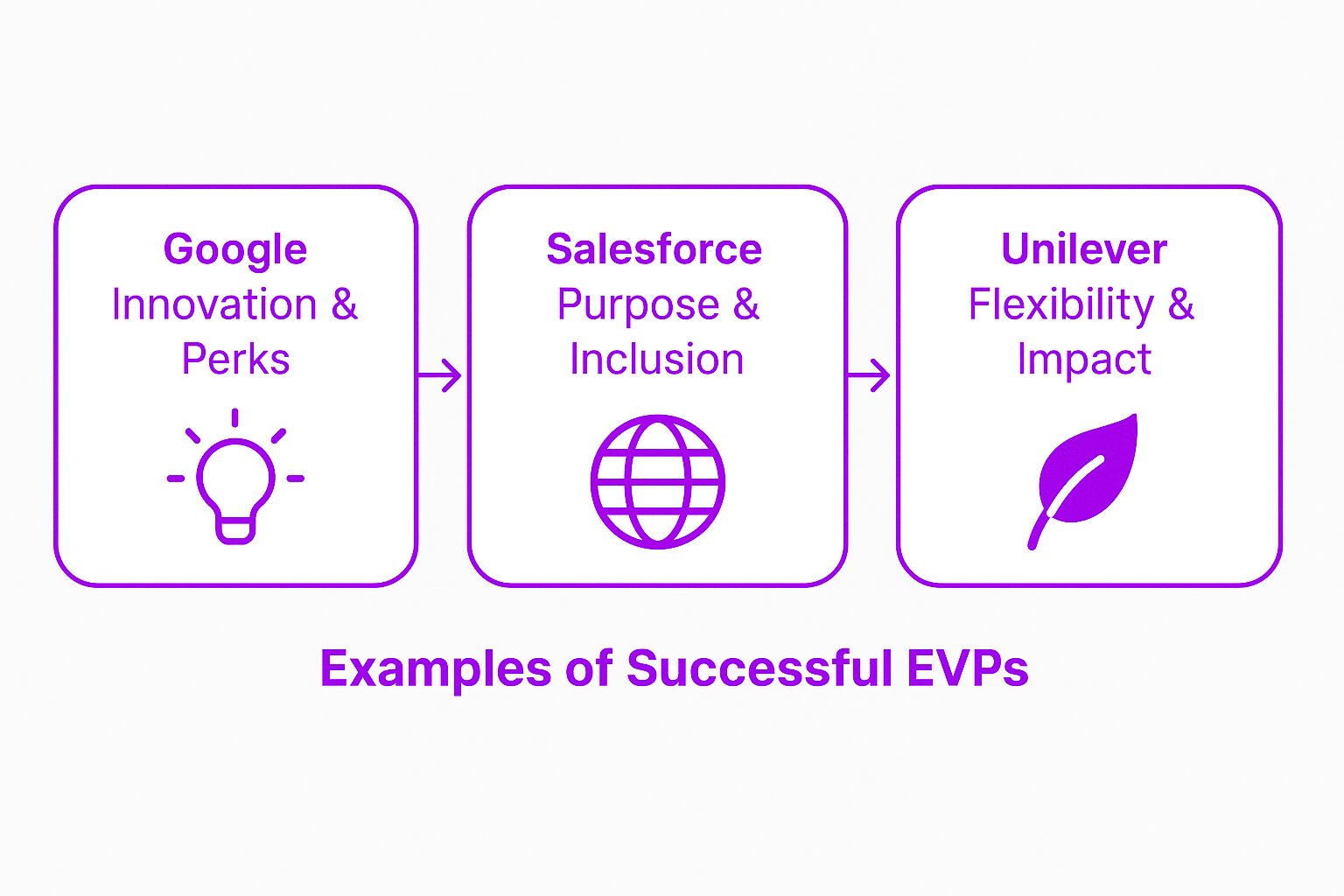What Is an Employee Value Proposition?
An Employee Value Proposition (EVP) is the set of benefits, rewards, and cultural elements that an organization offers employees in exchange for their skills, experience, and commitment. An attractive employee value proposition outlines these benefits and rewards, positioning the company as a desirable workplace and differentiating one employer from another, shaping how current and potential employees perceive the company.
EVP is more than just salary and perks. It includes career growth opportunities, company culture, leadership style, and work-life balance. Companies with a strong EVP attract and retain top talent, improve engagement, and foster long-term loyalty.
How EVP Works
An EVP acts as a company’s promise to employees. It defines why someone would want to work there instead of another organization. Companies build EVPs based on employee expectations, business goals, and market conditions. When executed well, EVP strengthens employer branding and improves workforce satisfaction.
EVP applies to both recruitment and retention. It helps attract candidates who align with the company’s mission while keeping current employees engaged. EVP must be clear, authentic, and consistently communicated across hiring, onboarding, and day-to-day operations.
Key Components of an EVP

Compensation
Employees expect fair and competitive pay as part of the employer value proposition. Salary, bonuses, incentives, and equity programs all form part of the EVP. Organizations must ensure that their compensation structure aligns with industry benchmarks and employee expectations.
Benefits
Beyond salary, employees evaluate a company’s benefits package. A student loan paydown program can significantly enhance employee wellness and satisfaction. Health insurance, retirement plans, parental leave, and wellness programs contribute to EVP. Flexible work arrangements, paid time off, and mental health support also enhance employee satisfaction.
Career Development
Employees seek opportunities for growth, and the best employee value propositions (EVPs) include career progression paths, mentorship programs, tuition assistance, and internal mobility options. Companies that invest in employee development see higher retention and engagement.
Work Environment
The workplace experience matters. Employees value a culture of respect, collaboration, and transparency. Factors like leadership style, diversity, inclusion, and teamwork influence EVP.
Work-Life Balance
Employees want balance between work and personal life. Companies that support remote work, flexible hours, and paid family leave appeal to candidates who prioritize well-being. EVP should reflect the organization’s commitment to a balanced work environment.
Recognition & Rewards
Employees want their contributions to be acknowledged. Performance-based rewards, public recognition, and appreciation initiatives reinforce EVP. A culture that values employee contributions fosters long-term engagement.
Why EVP Matters
Improves Talent Acquisition
A well-defined EVP makes recruitment easier. Job seekers are drawn to companies that offer a compelling value proposition. Organizations that effectively communicate their EVP attract the right talent faster and with fewer hiring costs.
Increases Employee Engagement
Employees who feel valued and supported are more engaged in their work. A strong EVP helps organizations create a positive workplace culture where employees are motivated to contribute.
Reduces Turnover
Companies with a well-established EVP can decrease annual employee turnover and retain employees longer. When employees see a clear path for growth, fair compensation, and a supportive work culture, they are less likely to leave.
Strengthens Employer Brand
EVP plays a key role in shaping employer reputation. Organizations that align their EVP with their brand message enhance their appeal to both employees and customers.
Benefits and Challenges of EVP
Benefits
-
Helps attract high-quality candidates.
-
Reduces hiring and onboarding costs.
-
Improves employee satisfaction and retention.
-
Strengthens company reputation and employer brand.
-
Creates a more engaged and productive workforce.
Challenges
-
Identifying what employees truly value can be difficult.
-
Balancing financial constraints with meaningful benefits.
-
Keeping EVP consistent across different employee demographics.
-
Measuring EVP effectiveness and making necessary adjustments.
Best Practices for Building a Strong EVP
Conduct Employee Research
Understanding what employees value in the labor market is crucial. Companies should use surveys, exit interviews, and focus groups to gather insights about employee expectations and workplace experiences.
Align EVP With Business Goals
An EVP should reflect company values and long-term objectives. Organizations that integrate EVP into their overall strategy see better alignment between employee engagement and business success.
Communicate EVP Effectively
A strong EVP should be visible at every stage of the employee journey. From job postings to internal communications, companies must reinforce their EVP consistently.
Keep EVP Flexible
Workforce expectations change over time. Organizations should regularly review and refine their EVP to stay relevant and competitive in the job market.
Measure EVP Impact
Tracking employee satisfaction, engagement, and retention helps assess EVP effectiveness. Companies should use data to identify areas for improvement and make necessary adjustments.
Related Concepts
Employer Branding
Employer branding is how a company markets itself as a desirable workplace. EVP is a key part of employer branding, helping shape public perception.
Employee Experience
Employee experience refers to the overall journey an employee has with a company. EVP directly impacts employee experience by influencing workplace satisfaction and engagement.
Employee Engagement
Employee engagement is the emotional commitment employees have toward their work. A strong EVP fosters higher engagement by aligning company offerings with employee expectations.
Talent Acquisition
Talent acquisition involves attracting and hiring top talent. A well-defined EVP enhances recruitment efforts by making a company more appealing to job seekers.
Real-World Examples of EVP
Google’s EVP focuses on innovation, career growth, and employee well-being. Perks such as on-site fitness centers, free meals, and flexible work arrangements attract top talent.
Salesforce
Salesforce emphasizes workplace culture and social responsibility. Its EVP highlights career development, inclusion initiatives, and employee wellness programs.
Unilever
Unilever promotes sustainability and purpose-driven work. Employees are drawn to its commitment to social impact, career development, and flexible working conditions.
Final Thoughts
A strong Employee Value Proposition is essential for attracting, engaging, and retaining top talent. Companies that define and communicate their EVP effectively build stronger teams, improve workplace culture, and gain a competitive edge in the job market.






